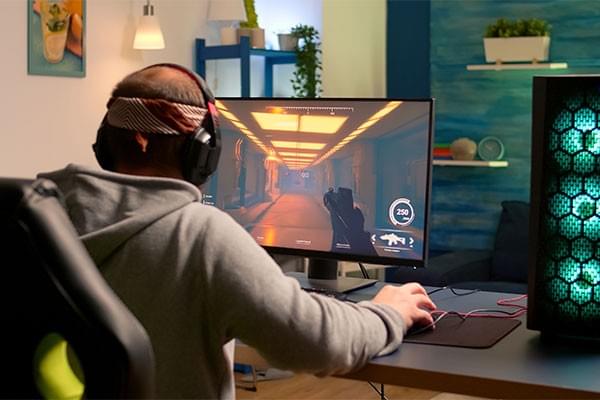Controlling an individual’s screen time can be difficult because screens are practically ubiquitous. How do you limit your child’s screen time? How will you know if you or your children have a screen or online games addiction? Come! Let’s discuss this in detail in this article.
Addiction to Online Games-Definition:
The inability of a person to control their use of a substance or action, notwithstanding the consequences, is what is known as an addiction. Some persons who are immersed in screen time or online gaming while ignoring other routine tasks may be addicted to online games. This addiction is an example of an impulse control disorder.
Why do People Develop an Online Game Addiction?

In response to an enjoyable event or hyperarousal, the reward region of the brain releases dopamine. The brain connects internet gameplay to dopamine release if a person experiences hyperarousal. A strong desire to pursue that same pleasure repeatedly emerges in the individual. Dopamine is a highly effective neurotransmitter in the brain. People may find it difficult to pull themselves away from a situation or activity since it helps maintain their interest and attention. It reinforces itself as well. Dopamine is released more frequently because of repeated exposure, which increases people's desire to repeat the behavior.
An Introduction to Online Game Addiction:
Many individuals own several screen-equipped electronic gadgets in a society that is becoming increasingly digital. However, a lot of parents are concerned about how screen time may affect both their children and themselves. Since screens are so prevalent at work and school, it might be challenging to fully avoid them.
People of all ages can find engaging content on screens. This is because their brains interpret and respond to sensory input as if it were happening to them. People frequently experience emotions when viewing a movie, such as crying, laughing, or being surprised. When a person plays an online game, they also have the same level of engagement.
The brain simulates a real-world environment while a person is playing a game. The gamer's body responds appropriately if the situation in the game is hazardous or aggressive. This fight-or-flight reaction to that imagined danger is brought on by being exposed to the game's extreme excitement and violence. Excessive gaming can cause the brain to be constantly stimulated, resulting in hyperarousal. Physical symptoms of chronic hyperarousal can include low immunological function, irritability, nervousness, depression, and fluctuating blood sugar levels.
Visit: how to eliminate negativity
However, spending too much time in front of a computer might harm one's physical, emotional, and social well-being. The following effects have been related to excessive screen usage:
- Obesity
- Poor sleep or sleeplessness
- Behavioral issues, including impulsive behavior
- Lack of social skills
- Aggression
- Less time for active play
- Vision problems
- Neck and spine problems
- Anxiety and depression
- Difficulty at work or school
Some Warning Signs of Online Game Addiction:

- Having strong desires for screen time or online games, and these desires are obstructing other thoughts.
- Spending money on online games when you cannot afford them.
- Limiting participation in social or recreational activities in favor of online gaming on screens.
- Playing online games despite knowing that it affects your life negatively, such as your performance at work or school, or neglecting home duties.
- Exhibiting indications of agitation, worry, or rage when compelled to quit playing, even for a little while.
- Lying to friends about your online gaming habits.
- Increasing the amount of screen time required to keep satisfaction levels constant.
- Not caring for your appearance, such as neglecting to dress appropriately or groom yourself.
When excessive screen time harms your relationships and health and you are unable to control it, like tobacco, alcohol, or drugs, this screen time can also turn into an addiction. The brain can undergo long-lasting or irreversible changes because of excessive screen usage, which can only be reversed by significant behavioral and medical interventions. You might enroll in personality grooming classes to balance your major life obligations.
Tips to Getting Rid of Addiction to Online Games:
Try these tips for both adults and children to limit the amount of time spent on online gaming:

1. Eliminate the psychological barriers that keep you playing games:
Your brain manipulates you into playing online games through your own cognitive biases and attachments. You defend your game because you don't want to throw away your money or your accomplishments. To quit, you must overcome these obstacles. The best treatment for online game addiction, according to many specialists, is cognitive behavioral therapy. Through this therapy, an addict can change their way of thinking and replace unhealthy thought patterns with more constructive ones. You can participate in personality development training to see improvements in your attitude.
2. Find new interests to beat your boredom:
There can't be anything worse than being bored all day, so if you're lying in bed, looking up at the ceiling, you'll justifiably rationalize playing online games. Finding substitute activities is necessary for an effective quit. You can do other things every day, such as exercise. By doing this, the negative effects of prolonged sitting and playing will be reduced. Show others how to utilize screens and online games in a healthy way. When you first arrive home from work, during supper, and while driving, think about turning off all electronics. Showcase many ways to unwind and have fun, such as going for a walk, participating in physical activity, throwing a dance party, or reading a book.
3. Stop wasting time and start working harder:
You're playing the game to escape and procrastinate. To stop gaming is to decide to begin pursuing your aspirations and goals. It's a pledge to fulfill your potential. To do it, you must learn good time management techniques. Set time restrictions for play and follow them. Encourage a healthy balance between screen time and social interaction-demanding activities like family time and extracurriculars. Establish scheduled, screen-free periods, such as during meals, in the mornings, and before bed.
4. Resist your urges and cravings to avoid a relapse:
You will feel a variety of emotions and withdrawal symptoms when you stop playing online games. You must carefully manage these to prevent a relapse. Keep phones and other electronics out of the bedroom to prevent late-night gaming. All devices must be charged overnight outside of the bedrooms. Only let your kids play games that are appropriate for their ages after learning about the different game rating categories. Apps that limit the amount of time your child can use a smartphone should be taken into consideration.
Visit: benefits of presence of mind
5. Get rid of your gaming addiction:
Although strategies and techniques are excellent, they are useless without the right mindset. If you want your recovery to be successful over the long term, you must develop your thoughts and prepare for the common challenges you may encounter.
Hope that these suggestions will help you kick your online games addiction! Follow these tips to live a healthy and balanced lifestyle! Have a long, happy life! Bye-bye!